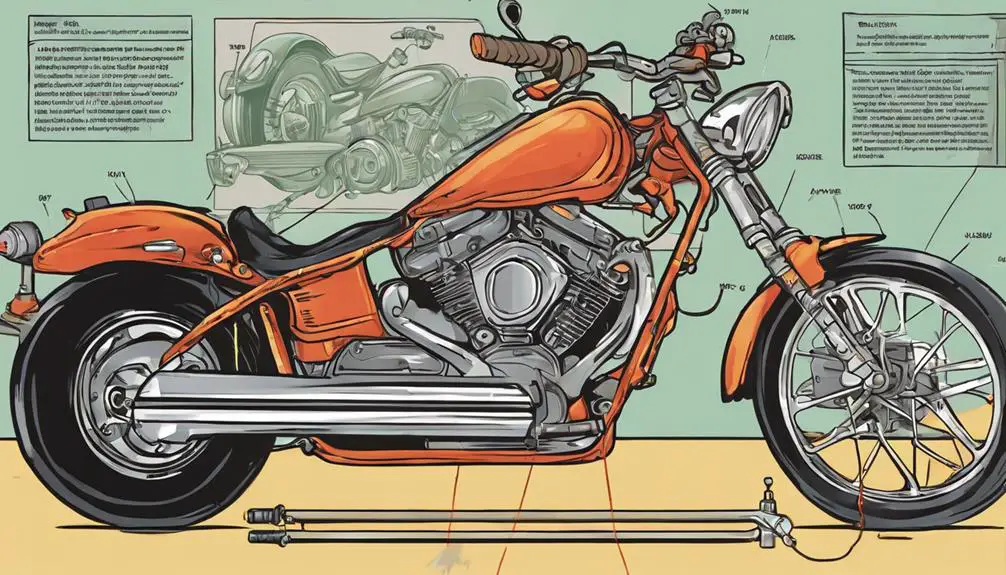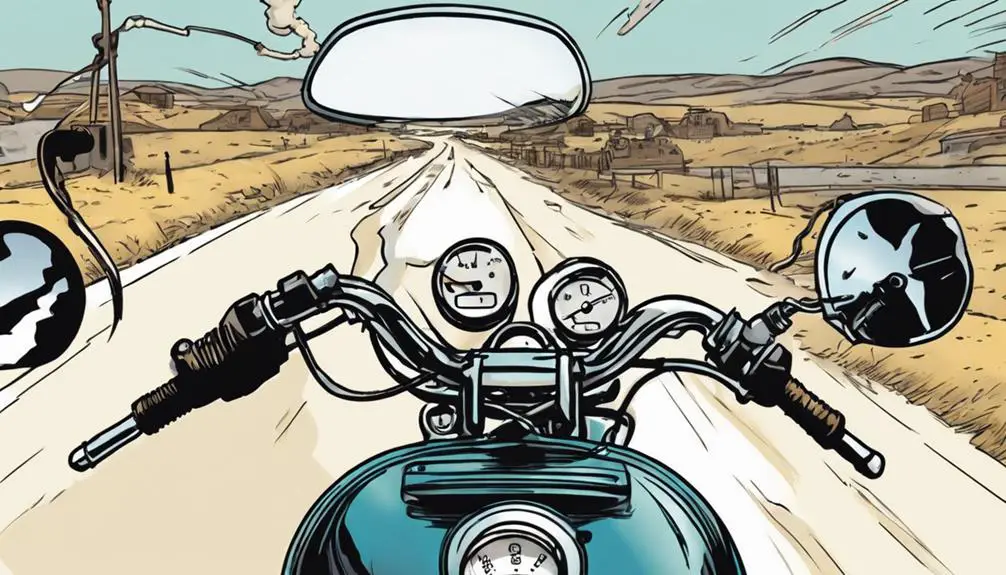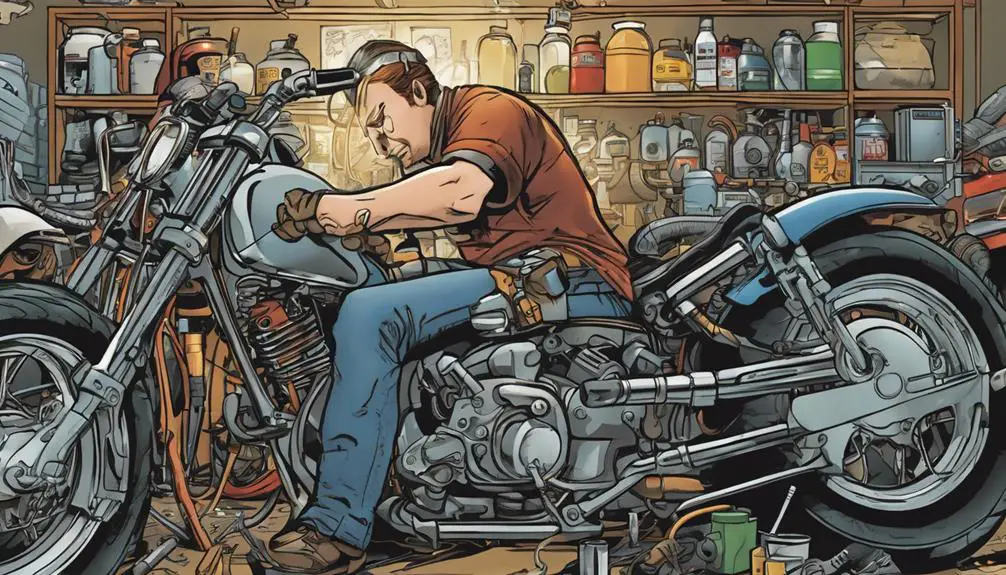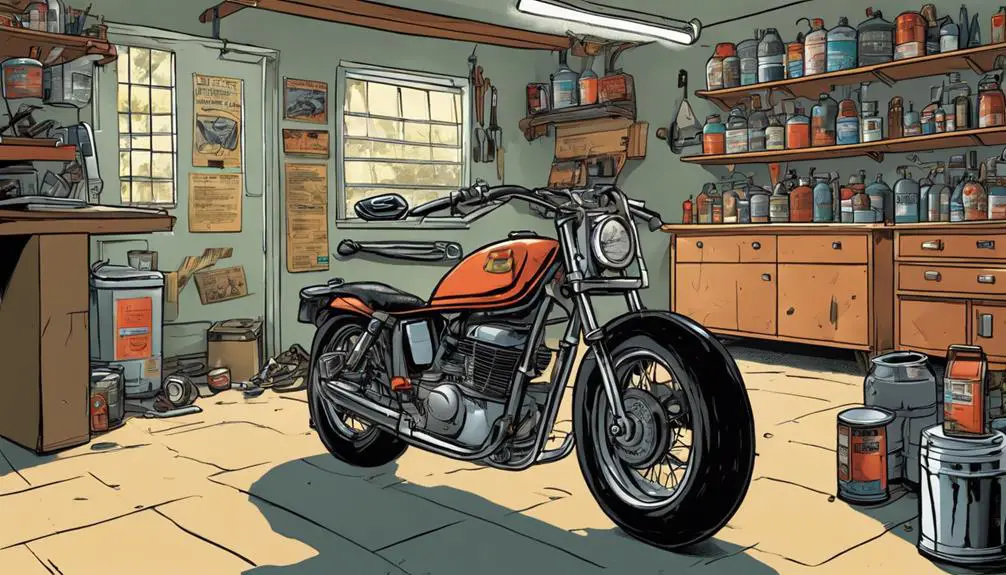Just as a well-tuned orchestra relies on each instrument to create harmony, your bike's fuel system needs careful attention to function smoothly. You might not realize it, but fuel system issues can sneak up on you, affecting performance and safety. By implementing a few straightforward practices, you can prevent common problems and enhance your bike's longevity. If you're curious about what these effective tips are and how they can make your ride more reliable, keep exploring the essential steps to guarantee your bike's fuel system runs like a dream.
Quick Takeaways
- Regularly inspect and replace fuel filters to prevent clogs and ensure smooth fuel flow to the engine.
- Check fuel lines for cracks or leaks to enhance safety and maintain efficiency.
- Use high-quality fuel to minimize contamination and protect the fuel system components.
- Clean the carburetor or fuel injectors periodically to avoid buildup that can affect performance.
Understanding Fuel System Basics

To keep your bike running smoothly, it's essential to grasp the basics of its fuel system, including how fuel flows from the tank to the engine. Understanding this flow empowers you to maintain your freedom on the road.
The journey begins when you fill your tank; gravity or a fuel pump moves the fuel through the fuel lines. It's important to recognize that clean fuel is your bike's lifeblood, ensuring peak performance.
As the fuel travels, it passes through a filter that catches impurities, preventing them from reaching the engine. Next, it enters the carburetor or fuel injectors, where it mixes with air in a precise ratio. This mixture is necessary for combustion, giving your bike the power it needs to roar to life.
You've got control over your bike's fuel system by regularly checking the fuel lines and filters for leaks or blockages. Keeping a close eye on these components not only enhances performance but also extends your bike's lifespan.
Common Suzuki Fuel Problems
Understanding the basics of your bike's fuel system can help you identify common Suzuki fuel problems that may affect performance.
One common issue is fuel contamination. If you've filled your tank with dirty or old fuel, it can clog filters and injectors, causing your bike to sputter or stall.
Another frequent problem is a failing fuel pump. A pump that's weak or malfunctioning may not deliver the necessary fuel pressure, leading to poor acceleration and reduced power.
You should also consider fuel line leaks, which can lead to dangerous situations and affect your bike's efficiency.
Clogged fuel filters are another concern. If your Suzuki's filter is blocked, it can restrict fuel flow, creating performance issues.
Signs of Fuel System Issues

Watch for these signs that indicate your bike's fuel system might be experiencing issues.
If you notice your engine sputtering or hesitating during acceleration, it's a clear signal that something's off. A sudden drop in power or difficulty starting your bike can also point to fuel supply problems. Pay attention to any strange noises, like knocking or pinging, which could indicate fuel isn't reaching your engine properly.
If your bike's fuel gauge behaves erratically or you see fuel leaks beneath your ride, it's time to take action. A strong fuel odor while riding can also suggest a leak or a failing component, so don't ignore that smell.
Additionally, if you experience poor fuel efficiency or your bike stalls unexpectedly, these are critical signs that your fuel system needs attention.
Don't let these issues hinder your freedom on the road. Being proactive by recognizing these signs can help you address potential problems before they escalate. Trust your instincts; your bike deserves to run smoothly and powerfully, allowing you to embrace the open road without worry.
Regular Maintenance Tips
Regular maintenance is key to preventing the signs of fuel system issues and keeping your bike running smoothly.
Start by inspecting your fuel lines and connections regularly. Look for cracks, leaks, or any wear that could disrupt your ride. Clean or replace your fuel filter as needed; a clogged filter can choke your bike's performance.
Next, keep your fuel tank clean. Additives can help prevent deposits from building up, but don't forget to regularly drain any old fuel that could cause problems.
You should also check your air filter, as a clean filter guarantees your engine gets the right mix of air and fuel.
Don't skip on changing your oil and oil filter following your bike manufacturer's schedule. Fresh oil keeps your engine lubricated and running efficiently, which indirectly supports your fuel system.
Troubleshooting Steps

If your bike's performance starts to dip, it's time to explore some troubleshooting to identify fuel system issues.
First, check the fuel level in your tank. If it's low, you might simply need to refuel.
Next, inspect the fuel filter. A clogged filter can restrict flow, so replace it if it looks dirty.
Then, take a look at the fuel lines. Look for cracks or leaks, which can cause pressure drops.
If everything seems intact, it's time to examine the fuel pump. Listen for unusual noises or vibrations; a malfunctioning pump could be the culprit.
Don't forget to check the carburetor or fuel injectors. Clean them if they're gunky, as buildup can hinder performance.
When to Seek Professional Help
If you notice warning signs like unusual noises or performance issues, it's time to contemplate seeking professional help.
Some repairs can get complicated, and tackling them on your own might lead to more problems.
Trust your instincts—when in doubt, consult a mechanic.
Warning Signs to Observe
Watch for these warning signs that indicate it's time to seek professional help for your bike's fuel system. Ignoring these symptoms can lead to bigger problems down the road, so stay alert and take control of your ride!
Inconsistent Engine Performance: If your bike's engine sputters, hesitates, or struggles to start, it could be a sign of fuel delivery issues.
Unusual Noises: A loud knocking or pinging noise from the engine may indicate that fuel isn't reaching the combustion chamber properly.
Fuel Leaks: Any visible fuel leaks under your bike are serious. It's not just a performance issue; it poses a safety hazard.
If you notice any of these signs, don't hesitate to reach out to a professional. Your bike deserves expert attention to guarantee it runs smoothly and safely.
You're not just a rider; you're an individual pursuing freedom on two wheels. Embrace the journey, but know when to call in the pros to keep that adventure alive.
Complex Repairs Required
Sometimes, tackling complex repairs on your bike's fuel system requires professional expertise to guarantee everything runs smoothly and safely. If you notice persistent fuel leaks, erratic engine performance, or odd noises coming from the fuel system, it might be time to call in the pros. These issues can often hint at deeper problems that aren't just a quick fix.
You might think you can handle it all, but some repairs demand specialized tools and knowledge that you may not have. For instance, if you're dealing with clogged injectors, a malfunctioning fuel pump, or an electronic control unit that's gone haywire, you're best served by a trained mechanic.
They'll not only diagnose the problem accurately but also make certain that every component functions in harmony.
Preventative Measures for Longevity

To guarantee your bike's fuel system lasts longer, regular maintenance and timely inspections are essential. You don't want to find yourself stranded due to avoidable fuel system issues. Taking proactive steps can save you time, money, and the freedom you crave on the open road.
Here are some key preventative measures to evaluate:
- Inspect Fuel Lines: Regularly check for cracks or leaks. Damaged lines can lead to fuel loss and performance issues.
- Change Filters: Replace fuel filters as recommended. Clogged filters restrict fuel flow, affecting your bike's performance and efficiency.
Common Questions
How Can I Tell if My Fuel Is Contaminated?
You can tell if your fuel is contaminated by checking for signs like discoloration or a strange odor.
If you notice a layer of water or sediment at the bottom of your fuel tank, that's a red flag.
When you try to start your engine, if it sputters or struggles, it might be a sign of bad fuel.
Trust your instincts and don't hesitate to get your fuel tested if you're unsure.
What Fuel Octane Rating Is Best for My Bike?
Imagine your bike's engine as a finely tuned orchestra, where the fuel octane rating acts like the conductor. You want it to harmonize perfectly for a smooth ride.
Generally, most bikes thrive on a rating between 87 and 93 octane. If you're feeling adventurous, test higher octane fuels for better performance, but don't overdo it—your engine craves balance, not chaos.
Trust your instincts; the right fuel will set you free on the open road.
Can Using Old Fuel Damage My Bike's Engine?
Yes, using old fuel can definitely damage your bike's engine.
When fuel sits too long, it can degrade and form varnish, clogging filters and injectors. You're risking poor performance and potential engine failure.
It's essential to keep your fuel fresh, especially if you love the freedom of the open road.
Regularly check your fuel and replace it if it's older than a month or two to keep your ride smooth and enjoyable.
How Often Should I Replace My Fuel Filter?
You should replace your fuel filter every 10,000 to 15,000 miles, but it's wise to check your bike's manual for specific recommendations.
Regularly changing the filter keeps your fuel system clean and helps maintain peak performance.
If you notice a drop in power or engine struggles, consider swapping it out sooner.
Staying proactive with your maintenance liberates you from potential issues, allowing you to enjoy your ride without unnecessary worries.
Is It Safe to Use Fuel Additives Regularly?
Using fuel additives regularly can be like adding a pinch of salt to a dish; it enhances performance, but too much can spoil the flavor.
You'll find that some additives can clean and protect your fuel system, but overusing them might lead to unintended consequences.
Stick to manufacturer recommendations, and listen to your vehicle's needs.
Embrace the freedom of informed choices, and keep your engine running smoothly without unnecessary risks.
Wrapping Up
To conclude, tackling fuel system issues in your bike doesn't have to be overwhelming.
You might think these problems require a mechanic's expertise, but with a little knowledge and routine maintenance, you can manage many issues yourself.
By following these tips, you're not only enhancing your bike's performance but also extending its lifespan.
So grab your tools and get started—your ride will thank you for it!